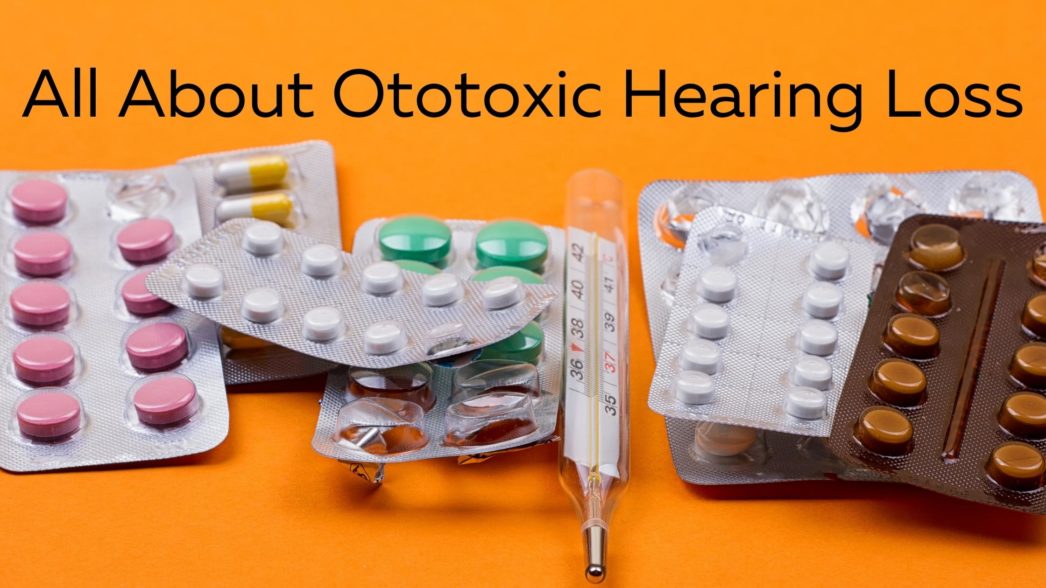Hearing loss can be caused by a wide range of factors, from infections to noise exposure to natural aging processes. One of the most unexpected causes of hearing loss is from certain medications. Medications that can damage your hearing are called “ototoxic” – literally meaning “harmful to the ears”. They can cause hearing loss suddenly or gradually, often in permanent ways but sometimes temporarily as well as causing tinnitus or balance issues.
Before we begin talking about ototoxic medication it is important to state that you should never change your medication routine without first consulting with your medical care provider. Sometimes ototoxic medications are the best treatment option for your needs, and hearing issues are monitored and addressed by a hearing specialist as they arise. If you are concerned about ototoxicity in your medications, consult with your primary care provider.
What Drugs are Ototoxic?
There isn’t a common ingredient that makes a medication ototoxic, and ototoxic drugs are used to treat a wide range of health issues such as infections and inflammations – even cancer or heart disease.
Some of the most common ototoxic drugs include the following:
- Anti-inflammatory drugs that are non-steroidal, such as ibuprofen and naproxen.
- Chemotherapy and anti-cancer drugs such as bleomycin and cyclophosphamide.
- Diuretic drugs used for heart and blood pressure concerns such as bumetanide and furosemide.
- Antibiotics characterized as “aminoglycosides” including neomycin and streptomycin.
- High doses of painkillers such as aspirin.
Signs of Hearing Loss from Ototoxic Drugs
If you currently take an ototoxic drug it is important to be aware of the signs of hearing loss and to notice changes in the way you hear. The effects of ototoxic medication vary from person to person and depend in large part on dosage and the length of time on the medication. Sometimes the amount of medication taken throughout one’s lifetime is a factor and in the case of chemotherapy drugs, infusion rate may determine some ototoxic outcomes. The ototoxic side effects of drugs can also be exacerbated by other medication being taken.
One of the first signs that ototoxic medication may be changing the way you hear is the development of tinnitus, a phantom ringing or tonal sound in the ear. Tinnitus can be distracting and frustrating, pulling your attention away from activities and conversations. Ear damage can also begin to manifest itself as balance issues or dizziness as the inner ear is responsible for both hearing and balance.
Hearing loss from ototoxic drugs can happen suddenly, but more often it occurs very gradually. Signs of hearing loss include trouble following conversations, having to ask for speech to be amplified or repeated, withdrawing from social activities, and turning up the volume on radios, televisions and other devices. If you are taking ototoxic medication and notice any signs of hearing loss it is important to have your hearing examined.
Managing Ototoxic Drugs
When you are prescribed a new medication, your prescribing health care provider will go over possible side effects with you, including possible ototoxic effects. You may want to discuss the possibility of alternative medications with your physician to see if there are options that do not have ototoxic side effects. In some cases, medication or dosage can be adjusted to eliminate or reduce the risk of hearing damage.
In some cases, ototoxic drugs offer the best course of treatment. When this is the case, it is important to be proactive about your hearing health. Regardless of your age, you should get a hearing exam once a year while taking ototoxic drugs. An annual exam can catch changes to your hearing early when they are easiest to address. Your hearing specialist will ask you about the ototoxic medication you take in order to appropriately understand and monitor any hearing issues that may arise.
When left untreated, hearing loss can lead to a wide range of problems with your overall health and quality of life. This is why it is important to treat hearing loss when it occurs. If you face hearing loss from ototoxic drugs, it can be effectively managed with hearing aids and other assistive devices. Hearing aids can make your hearing clearer and more complete, and improve health outcomes related to hearing loss.


